
Seems clear at this point that prop 15 will not find enough support in the remaining uncounted votes to pass. My guess is that without covid it would have narrowly passed, but people got nervous about the impact on small businesses during the crisis. What are y’all’s takeaways?
Prop 13 is such a third rail in California politics, it’s incredible we even got this close to overturning half of it. Ads targeting homeowners saying this would be a slippery slope to taking away their protections probably had a big impact too
Property taxes are the least popular form of tax, in part because they violate people incorrect but intuitive sense of fairness (having to pay on something you “own,” and detached from your current flows of income). Should keep pushing, but also be pragmatic on using other taxes
One map I want to see: how much did Biden out perform prop 15 in each county?
• • •
Missing some Tweet in this thread? You can try to
force a refresh









